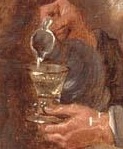
“Long you live and high you fly
Smiles you’ll give and tears you’ll cry
And all you touch and all you see
Is all your life will ever be” (Pink Floyd, “Breathe”, 1973)
Contrary to popular belief (and advertisers everywhere), people don’t need a product, service or lifestyle to enjoy life.
A moment of peace in a park or beside a drainage ditch with a Great Blue Heron can stop a busy brain from blocking beauty.
Without the blinders of identity and self-interest, a person can go from listening to an interior monologue capable of souring any perspective (and ruin your life), to enjoying the smallest things—a ladybug on a leaf, ducks quacking and water vapour (for no reason).

Breathing can be enjoyable. In the midst of a problem, you can enjoy breathing (assuming that it is safe to do so).
If you hold your breath long enough, your body breathes for you. Combine this breathed sensation with a heart beating autonomously and you can appreciate self-driving organic automation. 
But breathing and heart-beating (consciously or not) gets boring. After breathing (even if it is enjoyable), people get distracted and ask like Peggy Lee did, “Is that all there is?”
What’s easily enjoyed is easily ignored. We might want to enjoy more, but therein is our problem: What we enjoy triggers our brain’s “reward” centers and makes pleasure habit-forming (see also: “Hedonism, Selfishness and a Womb with a View”).
A pleasure repeated can “set up potentially harmful routines, such as overeating, smoking, drug or alcohol abuse, gambling and even compulsive use of computers and social media” (Breaking Bad Habits).
Enjoyment (and addictive drugs) prompts the brain to release dopamine—a chemical responsible for transmitting signals between nerve cells.
Dr. Russell Poldrack, a neurobiologist at the University of Texas comments, “If you do something over and over, and dopamine is there when you’re doing it, that strengthens the habit even more. When you’re not doing those things, dopamine creates the craving to do it again” (source).

Therefore, it isn’t prudent to do whatever thou wilt. One will soon find one’s self on auto-pilot, following a predetermined sequence of operations conditioned by habit prompted by pleasure.
One may soon find one’s self on a Hedonic Treadmill chasing a craving for happiness that becomes evermore unattainable.

“The hedonic treadmill, which is also referred to as hedonic adaptation, is a metaphor for your set point of happiness. The idea here is that no matter how good or bad something makes you feel, you will eventually return to your original emotional state” (developgoodhabits).

Cue music: “The Windmills of Your Mind“:
“Round like a circle in a spiral, like a wheel within a wheel
Never ending or beginning on an ever spinning reel
Like a snowball down a mountain, or a carnival balloon…
Like a tunnel that you follow to a tunnel of its own
Down a hollow to a cavern where the sun has never shone
Like a door that keeps revolving in a half forgotten dream
Or the ripples from a pebble someone tosses in a stream…”
“
Aristippus (435-356 BC) the philosopher saw danger in pleasure and advised, “It is not abstinence from pleasures that is best, but mastery over them without being worsted” (source).

The philosopher Epicurus (341-270 BC) agreed, but his idea of pleasure was ataraxy, “a state of serene calmness.”
Epicurus advised us not to be ambitious but to live in harmony with nature and strive for tranquility brought by contentment with simple things and the absence of pain.
 Existential Comics: Was Epicurus Really a Hedonist?
Existential Comics: Was Epicurus Really a Hedonist?
Our happiness formula is backwards. We think, “If I do something great, work overtime, get straight A’s, achieve some goal, then I’ll become more successful, and then I’ll be happier.”
But a few weeks after a goal is achieved, the trip over, the new treasure made familiar, happiness levels return to normal and a new goal is needed to achieve happiness later.

The trick to evading the trap of cravings and treadmills is to not wait until later to be happy. Save time and be happy first! To do that, it’s quite simple: Go without expectations, forget who you are and shift from thinking, “I must do something,” to, “I must do nothing.” The real trick is to enjoy reality as it is, because it is.

You are free to enjoy, but enjoying the world as it is, as you are, is difficult for people who are weighed down by time and things to be done.
Accepting reality without need, fear, or demand, with a sigh, without resistance, “this is what it is,” you suddenly find yourself relaxing into what there is (see also: “This too shall pass“).
 On a cold winter’s night long ago an old man sits happy by a fire. He enjoys warming himself after a difficult day and realizes with surprise how fantastic he feels.
On a cold winter’s night long ago an old man sits happy by a fire. He enjoys warming himself after a difficult day and realizes with surprise how fantastic he feels.
 As he pours wine for he and his friend, the old man realizes that the whole struggle he’s had has always been between himself and the pressure of his experience to enjoy or not enjoy life. That is the battle we all wage, but now he knows that there is no need for such a struggle to prevent him from enjoying life because he can enjoy the struggle itself!
As he pours wine for he and his friend, the old man realizes that the whole struggle he’s had has always been between himself and the pressure of his experience to enjoy or not enjoy life. That is the battle we all wage, but now he knows that there is no need for such a struggle to prevent him from enjoying life because he can enjoy the struggle itself! The old man who earlier saw without seeing now disappears in seeing! He no longer is in a room with a friend and a fire as a cold wind blows outside. He is the room! He is his friend! He is the fire! He is the cold wind that blows up to the stars! The old man has broken free! In this act of imagination he feels no separation.
The old man who earlier saw without seeing now disappears in seeing! He no longer is in a room with a friend and a fire as a cold wind blows outside. He is the room! He is his friend! He is the fire! He is the cold wind that blows up to the stars! The old man has broken free! In this act of imagination he feels no separation. Nothing hurts. Nothing disturbs. He smells the smoke and hears the stew simmer. He feels the weight of his beautiful hat on his head. He touches his shirt with gnarled fingers and feels nothing but love for all that is and was.
Nothing hurts. Nothing disturbs. He smells the smoke and hears the stew simmer. He feels the weight of his beautiful hat on his head. He touches his shirt with gnarled fingers and feels nothing but love for all that is and was. Poet John Keats (1795-1821) called it “the empathic entrance into essence.” He writes in
Poet John Keats (1795-1821) called it “the empathic entrance into essence.” He writes in  Without imagination and attention our senses are filtered through self-thought. Every “thing” is a “think.” Thought can distract us from the enjoyment of living in the same way that looking down texting on an iPhone as we walk can take us unknowingly into the path of an oncoming truck!
Without imagination and attention our senses are filtered through self-thought. Every “thing” is a “think.” Thought can distract us from the enjoyment of living in the same way that looking down texting on an iPhone as we walk can take us unknowingly into the path of an oncoming truck!
 While he was scuba diving Black probably did lose his mind, not to madness, but to a beautiful feeling when there’s nothing in it but the beauty of being in the beauty of what’s all around. When inner talk runs between wanting and not-wanting, and liking and disliking is stopped—particularly in a natural setting—we can feel aware of beauty in the outside world and enjoy it like nothing else.
While he was scuba diving Black probably did lose his mind, not to madness, but to a beautiful feeling when there’s nothing in it but the beauty of being in the beauty of what’s all around. When inner talk runs between wanting and not-wanting, and liking and disliking is stopped—particularly in a natural setting—we can feel aware of beauty in the outside world and enjoy it like nothing else. 

 Enjoyment can be conscious – as in, you consciously choose to read this – or unconscious – as in, you feel something without knowing why.
Enjoyment can be conscious – as in, you consciously choose to read this – or unconscious – as in, you feel something without knowing why.

 When you enjoy, you become as a poet.
When you enjoy, you become as a poet.


 Self-help is defined as, “the use of one’s own efforts and resources to achieve things without relying on others” (Google).
Self-help is defined as, “the use of one’s own efforts and resources to achieve things without relying on others” (Google). It’s obvious: Each is unique. You are you. Bieber is the Biebs and Beethoven only looks constipated.
It’s obvious: Each is unique. You are you. Bieber is the Biebs and Beethoven only looks constipated. People have a mania for comparing and under or over rating each other. We’re opinion machines.
People have a mania for comparing and under or over rating each other. We’re opinion machines. This has nothing to do with your self. It’s not about you. That is, the thing to do is to forget yourself. Enjoy all you see, hear and feel. No ego. No win. No lose. No success. Be as 24 hour radio: All humility! All the time!
This has nothing to do with your self. It’s not about you. That is, the thing to do is to forget yourself. Enjoy all you see, hear and feel. No ego. No win. No lose. No success. Be as 24 hour radio: All humility! All the time!

 Research psychiatrist and neuroplasticity – conscious use of directed thoughts – expert, Jeffrey Schwartz says, “You Are Not Your Brain.” He explains that the mind or, “directed attention,” changes how the brain sends messages.
Research psychiatrist and neuroplasticity – conscious use of directed thoughts – expert, Jeffrey Schwartz says, “You Are Not Your Brain.” He explains that the mind or, “directed attention,” changes how the brain sends messages.
 It’s not that we want to stop firing, it’s that we want things firing to help us enjoy. The trick to beautiful enjoyments is to realize that what your brain is doing isn’t you, as in: “Excuse me. That wasn’t me. It was my brain.” Schwartz calls this your “true self” or “wise advocate. You can change your brain effectively through “wise focus of attention.”
It’s not that we want to stop firing, it’s that we want things firing to help us enjoy. The trick to beautiful enjoyments is to realize that what your brain is doing isn’t you, as in: “Excuse me. That wasn’t me. It was my brain.” Schwartz calls this your “true self” or “wise advocate. You can change your brain effectively through “wise focus of attention.” A poet of enjoyment lives in song.
A poet of enjoyment lives in song.